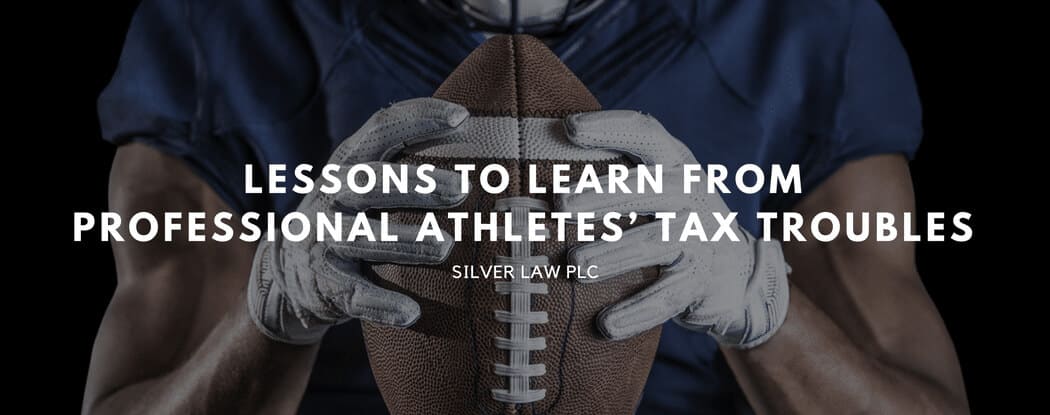How to Pay Taxes on Unsourceable Income When you collect your paycheck, you know that…
Professional athletes and income tax troubles: in recent years, the two have gone hand in hand. Las Vegas’s own Floyd “Money” Mayweather is currently embroiled in a United States Tax Court battle against the IRS in Las Vegas; the first round began when the IRS filed a $22.5 million tax lien against Mayweather in Las Vegas. In 1995, star baseball player Darryl Strawberry pled guilty to tax evasion, after knowingly failing to report more than $350,000 in income from autograph shows and special appearances. In 2012, the IRS filed a $1.7 million tax lien against World Cup champion skier Lindsey Vonn and her estranged husband. Why does it keep happening? Are athletes an easy target because of their soaring incomes? Or is there another cause?

More than likely, there are a number of factors at play. Youth and lack of financial experience; poor investment choices; and unqualified financial advisors can all contribute to an athlete’s tax troubles. And then there’s the simple fact that athletes—especially very high earners—face a unique tax issue that most salaried employees do not.
Salaried workers usually don’t run into federal income tax problems because their employers consistently withhold tax from their paychecks. And like clockwork, employers send W-2s to their employees after the first of the year so that they have the necessary information to file their income tax returns by April 15. Employees face some risk of under-withholding, but this usually doesn’t translate into income tax debts weighing in on the “Money” Mayweather scale. On that note, it’s important to point out here that taxpayers can always submit a new Form W-4 to their employer if too little—or too much—tax is being withheld from their paychecks. Taxpayers can obtain a blank Form W-4 from their employer or from the IRS website.
Athletes, however, face a unique tax challenge when they earn income outside of their normal salary. For example, some athletes earn massive sums from endorsements, professional appearances, and advertisements: think Tiger Woods and Nike, or David Beckham and Adidas. In IRS speak, these alternative forms of income are referred to as “non-employee compensation.” And this is where the troubles of modern athletes can become lessons for everyday taxpayers. This is especially relevant today as taxpayers choose the freedom of non-salaried work like freelancing or participation in the “sharing economy” of Uber and Airbnb.
When Nike, Adidas, and Under Armour, pay royalties, personal appearance fees, and other forms of non-employee compensation to endorsed athletes, they don’t withhold any taxes on these payments. The same is true when companies pay their independent contractors. And anytime individuals receive income with no taxes withheld at the source, they are at risk of running afoul with the IRS.
This is because the IRS requires that all taxpayers pay taxes as they earn income throughout the year, either through employer withholding or by making estimated quarterly tax payments. Failure to do so allows the IRS to assess estimated tax penalties. The estimated tax requirement is easily fulfilled through employer withholding; that’s why employees usually don’t encounter federal tax problems.
But athletes receiving large payments from their endorsement agreements or prize winnings must estimate their quarterly tax liabilities, thoughtfully set aside that cash, and then timely submit their estimated tax payments. Lack of organization, inexperienced financial advisors, and the temptation to spend can all contribute to an athlete’s tax troubles on April 15. These challenges also face self-employed taxpayers working as independent contractors or freelancers, though on a much smaller scale. IRS Publication 505, available on the IRS website, provides useful information to taxpayers on withholding and calculating their estimated tax requirements.
You don’t have to be a professional athlete to encounter issues with the IRS. If you have concerns about estimated taxes or a notice you’ve received from the IRS, a tax lawyer may be able to help you. Silver Law PLC is a respected tax law firm in Phoenix and Las Vegas that handles tax collections as well as audits, foreign tax reporting, innocent spouse relief, and more. We also represent clients in criminal tax and civil tax proceedings. Our attorneys have all worked as prosecutors for the IRS, so they have a unique perspective on how to defend your case. Contact us today to talk with a tax lawyer about your legal options.
How Do I Handle a Criminal Tax Investigation By The IRS? Paying taxes is a…
Recent Injunctions Updates To Beneficial Ownership Reporting Requirements Breaking Down The Latest Changes To BOI…
What Should I Do If I Disagree With The Outcome Of An IRS Audit? Learn…
4 Tax Schemes From The IRS's "Dirty Dozen" List That Can Get The Average Taxpayer…